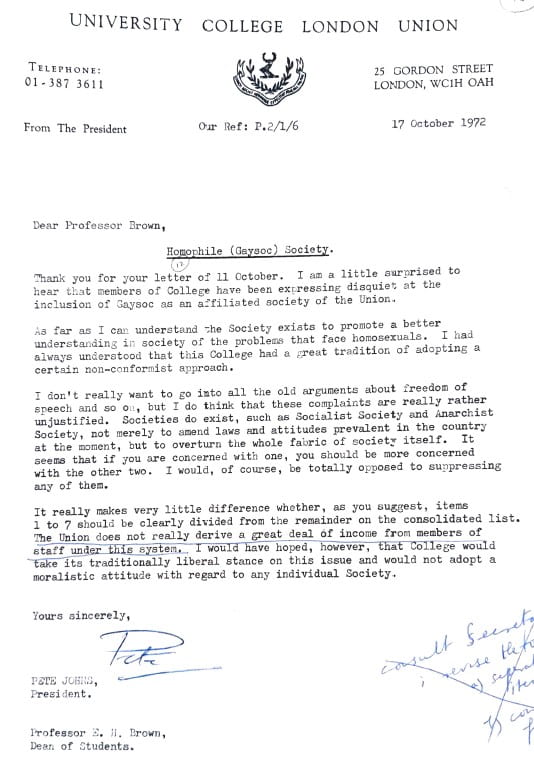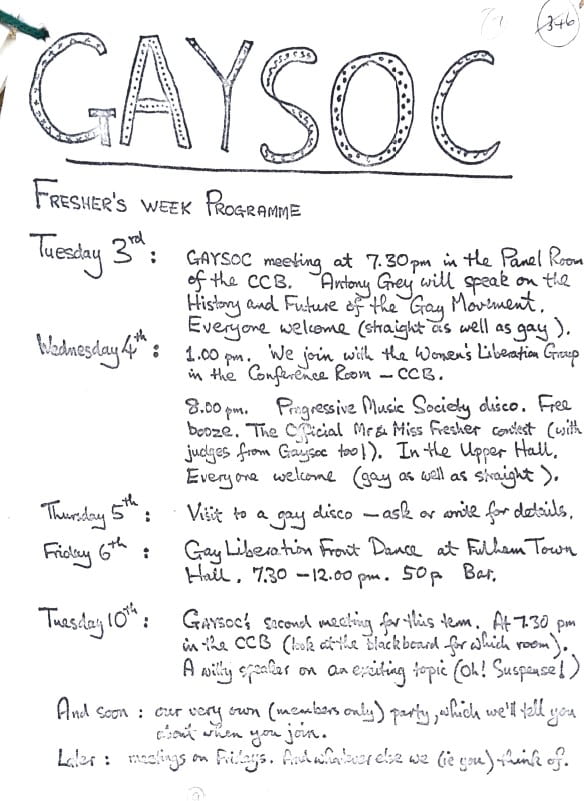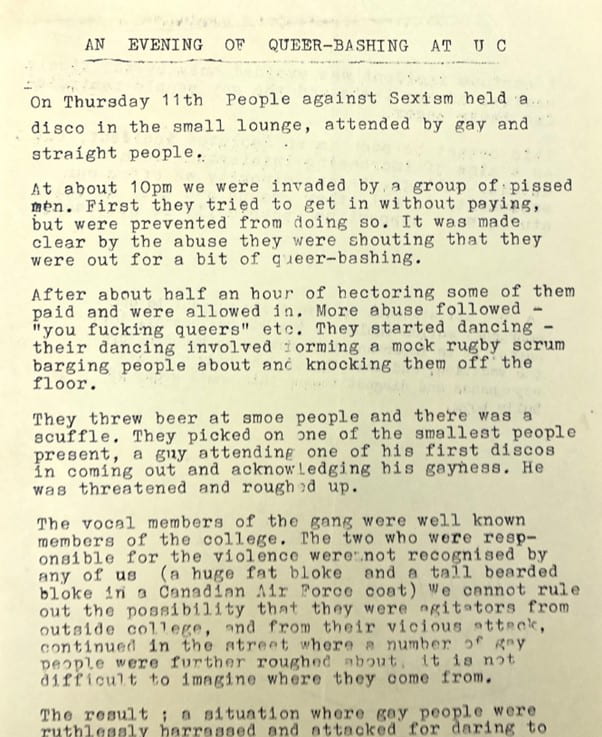‘Well really, have we come to that?’: Excerpts from UCL’s LGBT History
By Sarah S Pipkin, on 15 June 2021
Colin Penman, Head of UCL Records, writes about the internal documents that sheds light on the history of LGBTQI+ student life at UCL.
In March 1972, Jamie Gardiner, a PhD student in the UCL Department of Mathematics, now a lawyer and human rights activist in Australia, founded the Homophile Society, or Gaysoc at UCL. As far as we know, this was the first gaysoc to be founded in a UK university and affiliated to its student union.
This Thursday, 17 June, Dr Luciano Rila, who – appropriately – teaches in the Mathematics department, will give a talk on Zoom, ‘Gaysocs: a brief and incomplete history’ partly based on the registration file that is preserved in the College archive to help tell that story.
I don’t want to cover the same ground as Luciano, but thought it might still be interesting to share a few images from that file, and why we have these records (and why we don’t have others).
Regarded as an object, the file is as dull as every other UCL administrative file of its time. It’s one of many others recording the registration of affiliated societies, the kinds of societies that students have always liked to form: political and social, serious and frivolous. But this file is a bit different. The title of this piece comes from a letter written by Dick Bishop, Head of the Department of Mechanical Engineering, to the College Secretary, Arthur Tattersall, demanding to know ‘Who decreed that it is in the general interest that the College should be identified with sexual predilections in this way?’

UCLCA, Secretary 180/155 fol. 6
And J.T. Aitken, Professor of Anatomy, was ‘disturbed … I cannot understand why people should be allowed to make a parade of their aberration’. Tattersall shared these concerns, and involved the Dean of Students, Professor Eric Brown, who wrote to the President of the Union, Pete Johns, about the ‘risk of offending individuals in the College’. Fortunately, Johns declared his absolute opposition to suppressing Gaysoc, suggesting that the authorities should surely be more concerned about those societies that were based around socialism and anarchism, which are dedicated to ‘overturn[ing] the whole fabric of society itself’.

UCLCA, Secretary 180/155 fol. 15
As I’ve said, we have records of a lot of these societies, because there happened to be an established process for authorising them, which meant the central bureaucracy kept files meticulously, with reference numbers, information about who has consulted them, everything properly attached, and every page numbered. They are usually very slim files, containing only one or two pages, just recording the foundation, subscription, office-holders and so on. The Gaysoc file, on the other hand, contains a whopping 22 pages, and it’s not hard to see why: nobody cared much about the Northerners’ Society or the Brewing Society, but some members of UCL were definitely alarmed by the ‘Homophile Society’.
In other words, it’s only where there’s been some kind of trouble that there’s a bit more information. And this is how an institutional archive like the College archive tends to work. We have a lot of registers, minutes of Council and other administrative bodies, staff and student personal files and so on, because that’s our main function. But there are other aspects of life at UCL that, in the past, we were never required to preserve, the unofficial side that would tell us more about how life was actually lived. The Gaysoc file happens to contain a Freshers’ Week programme for 1972, which I think is unique in this series of files:

UCLCA, Secretary 180/155 fol. 7
It was originally preserved as evidence of ‘concern’ about ‘homosex’, but now it can tell other stories, about gay social life at this time, about links with the Gay Liberation Front and Campaign for Homosexual Equality. We are lucky to have in the College archive other material that tells these unofficial stories of staff and student life at UCL: rag mags, periodicals, campaign literature, photographs. But these have come to us in a really unsystematic way, sometimes without any context. For example, we don’t know why we have a copy of this wonderful poster by Alan Wakeman, published by Gay Sweatshop:

COLLEGE COLLECTION C9
or this terrifying account of gay-bashing, in a 1976 leaflet:

COLLEGE COLLECTION C9
We’ve recognised that this has implications about representation in the archive, that doing only ‘top-down’ collecting silences important voices and stories. We have a rich collection in the College archive, but will certainly be doing more ‘ground-up’ collecting to ensure those voices can be preserved and heard for the future.
To learn more about UCL Records, check out their main page. To book a ticket for ‘Gaysocs: a brief and incomplete history’ please visit their Eventbrite page.
5 Responses to “‘Well really, have we come to that?’: Excerpts from UCL’s LGBT History”
- 1
-
2
Philip Tyrer wrote on 28 July 2021:
I was at UCL from 1984-87. I used to go to the GaySoc room above the Bloomsbury Theatre from 1985-87. I remember a metal filing cabinet which contained minutes of what I recall was initially called the Bloomsbury Homophile Society. This was later changed to GaySoc following a visit by one of the members to New York, where he had come across the terminology. Again, my recollection is they kept those minutes for a period of some months. I can only regret I didn’t do something with the material. That said, it was energising to read in the mid 80s the efforts of those that went before.
-
3
Colin Penman wrote on 18 August 2021:

Thank you for your coment, Philip. It’s always a little heartbreaking to hear about lost records, especially those covering the mid-80s – such a key period in LGBT history…
-
4
Marc Carlton wrote on 23 June 2022:
I was chairperson of UCL Gaysoc in 1976-77, including the night when the Rugby Club invaded a gaysoc/PAS disco which you reference. I had left the disco when the invasion took place so I did not witness it. Members of the gaysoc and their allies were super-quick in pubicising what had happened and produced a satirical spoof called ‘God was I drunk last night’, purporting to be written by a closet-gay rugby club member, which we distributed around the college in the form of a flyer the next day. The event caused much consternation and many expressions of support for us and condemnation of the rugby club, whose chairman was Digby Jones, who now sits in the House of Lords. I’m afraid I don’t have any documentary material from this period. I used to have copies of two Gaysoc newsletters but donated them to the Museum of London archive about 15 years ago. We had a room in the CCB Theatre (as it was then called). I’m pleased to read that it was still there 10 years later.
-
5
Colin Penman wrote on 12 July 2022:

This is fascinating, Marc – thank you. You may not have any documentary material to donate (our loss is the MoL’s gain!), but you might be interested in Generation UCL, a major alumni oral history and collecting project: https://www.ucl.ac.uk/alumni/generation-ucl-200-years-student-life-london. It would be wonderful to learn more about your experiences, if that’s something you’d like to consider.
 Close
Close



A brilliant piece! I wish I had known about Dr Luciano Rila’s talk yesterday as it sounds fascinating. Thanks for posting this.